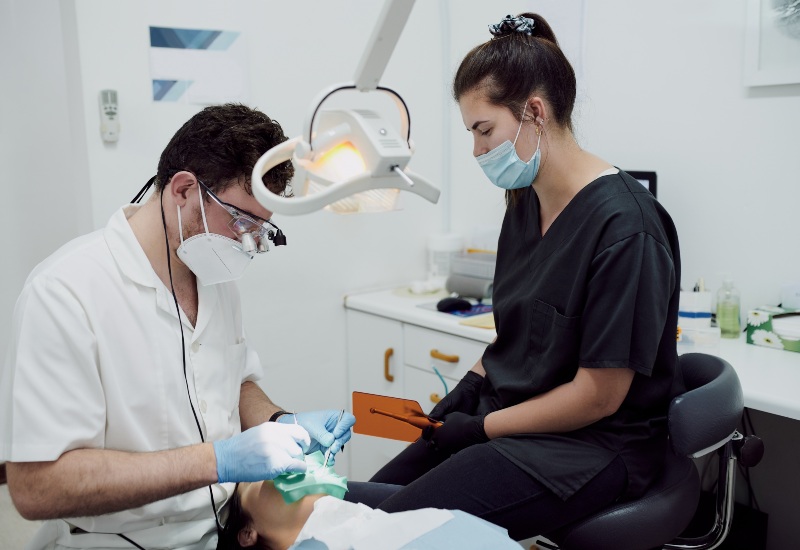Tips for Fast Recovery After a Root Canal Treatment
If you have an infected tooth, you’re probably experiencing a lot of discomfort and can’t find any relief from pain. Dental Care of Westlake in Westlake, OH treats these common infections and explains how to heal fast after a root canal procedure so you regain full function of your teeth as quickly as possible. Have you recently undergone a root canal or are you preparing for one? Here’s a quick guide to the recovery process so you know what to expect after the procedure, how to care for your mouth during recovery, and when to reach out for professional help.
What Is a Root Canal and Why Is Aftercare Important?
A root canal is a dental procedure used to treat infection or damage within the pulp of a tooth. During the treatment, the infected tissue is removed, the inside of the tooth is cleaned and disinfected, and the tooth is sealed to prevent future issues.

While the procedure is highly effective, aftercare is critical to the root canal healing process and avoiding complications. Following the dentist’s instructions and taking care of your mouth post-treatment can help you recover faster and maintain the health of your treated tooth.
What to Expect After a Root Canal
After your root canal, there will be an adjustment period with symptoms that subside within a few days if you take the proper steps and follow your care instructions. Immediately after, it’s normal to experience:
- Mild to moderate discomfort
- Sensitivity in the treated area
- Swelling or tenderness in the gums
- Numbness for a few hours due to anesthesia
Immediate Post-Root Canal Care (First 24–48 Hours)
The first two days after your root canal are crucial. Here’s what you should do:
- Rest and avoid strenuous activity to allow your body to heal
- Take prescribed medications or over-the-counter pain relievers as directed
- Avoid chewing on the treated side of your mouth until the numbness wears off and the tooth is fully restored
- Apply a cold compress to the outside of your cheek to reduce swelling
- Keep your mouth clean by gently brushing and flossing, avoiding the treated area if it’s sensitive
Tips for a Fast Root Canal Healing
Recovery times vary from person to person, but to help move the healing process along, follow these tips:
- Stay Hydrated – Drink plenty of water to support healing.
- Eat Soft Foods – Choose foods that are easy to chew and won’t irritate the treated area.
- Avoid Smoking and Alcohol – These can slow healing and increase the risk of infection.
- Follow Up With Your Dentist – Attend scheduled appointments to ensure the tooth is healing properly.
- Practice Good Oral Hygiene – Brush and floss regularly, but gently around the treated tooth.
What to Eat (and Avoid) After a Root Canal
Your root canal aftercare instructions should include guidance for dietary choices. These may sound obvious, but they’re a good reminder of what you can eat and what types of foods should be avoided until you’re fully healed. Following this helps the healing process.
Best foods to eat:
- Yogurt
- Mashed potatoes
- Smoothies
- Scrambled eggs
- Applesauce
- Cooked vegetables
Foods to avoid:
- Hard or crunchy foods (nuts, chips)
- Sticky foods (caramel, gum)
- Very hot or cold foods
- Sugary snacks
- Tough meats
Managing Discomfort and Swelling
Discomfort after a root canal is usually manageable. Here’s how:
- Use ice packs for 15–20 minutes at a time to reduce swelling
- Take ibuprofen or acetaminophen as recommended
- Avoid chewing on the treated tooth until your dentist places a permanent crown or filling
When to Call Your Dentist
Pay attention to your recovery to prevent complications and ensure your healing stays on track. You should reach out to your dental provider if you have concerns or notice any of the following:
- Severe pain that doesn’t improve with root canal pain relief instructions
- Swelling that worsens or spreads
- Signs of infection (fever, pus, foul odor)
- Allergic reactions to medication
- Difficulty chewing or biting
Long-Term Care After a Root Canal
Once your tooth is fully restored with a crown or filling, a long-term plan is essential to avoid additional tooth problems. Follow these tips:
- Maintain regular dental checkups
- Brush and floss daily
- Avoid biting hard objects
- Wear a mouthguard if you grind your teeth
Common Myths About Root Canal Recovery
People often cringe when they hear root canal mentioned. However, this is due to common misconceptions about the procedure and the results:
Myth: Root canals are extremely painful.
Truth: Modern techniques make the procedure virtually painless.
Myth: You don’t need to care for a tooth after a root canal.
Truth: Aftercare is essential to prevent reinfection.
Myth: Root canals cause illness.
Truth: This outdated theory has been debunked by dental research.
Contact Dental Care of Westlake
We hope these root canal recovery tips from Dental Care of Westlake in Westlake, OH have eased any fears about getting a root canal. If you’re experiencing tooth pain or suspect you may need emergency care, don’t wait. Contact us today to schedule your appointment.
FAQs About Root Canals
What Are Signs of a Tooth Infection?
Common signs include persistent pain, swelling, sensitivity to hot or cold, bad breath, and pus around the tooth.
How Long Does a Root Canal Take?
Most root canals can be completed in one to two visits, typically lasting 60–90 minutes per session.
Is the Process Painful?
Thanks to modern anesthesia and techniques, most patients report little to no pain during the procedure.
